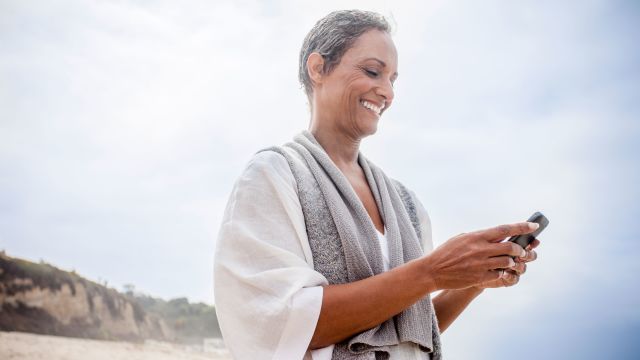You’ve taken the first step towards improving your health and have chosen to partner a health coach. You likely already know the benefits of coaching and you what to expect from a health coach. Now it’s time to set yourself up for success.
Here are a few tips for how to get the most out of your experience.
Know what to expect and come prepared
The most common misconception about health coaching is that a coach is going to tell you what to do and give you a specific plan, says Addie Spaller, a Sharecare coach manager in Ann Arbor, Michigan.
A coach is a collaborative partner who helps you figure out what you want to accomplish and why. Together, you develop long-term goals—say, to quit smoking—and then break that goal down into small, bite-sized action steps. For example, one action item might be to talk to your doctor about how smoking cessation aids can help you quit and which one is best for you. Each time you talk to your coach, you can review what you’ve accomplished and, if needed, come up with strategies for overcoming unexpected challenges.
To get the most of out of working with a coach, do an assessment of yourself before you begin. In what areas are you struggling? Where do you want to improve or make changes? “Come into the coaching conversation knowing what you want to talk about,” Spaller says, and remember, “We don’t judge. We’re here to support you and be another resource for you.”
Use technology wisely
Put your smart phone or pedometer to work for you. Use an app to track your steps, log your physical activity or record your meals, for example. “Phone reminders are huge,” says Rachel Potter, a Sharecare coaching manager based in Franklin, Tennessee. “Use your calendar to schedule healthy behaviors as if they were meetings that can’t be broken.”
Technology is also a way to gather important health information that can help your health coach. Sharecare, for example, offers the RealAge test, which tells you the biological age of your body—as compared to your chronological age—based on your lifestyle habits. If you smoke, your RealAge will likely be older than your chronological age. If you exercise regularly, you may be biologically younger than the calendar says you are.
“Uploading biometric data [measurements and data about your body, such as cholesterol levels or blood pressure] really helps paint a picture of a Sharecare member and where they want to start,” says Sharecare coach Kelsey Storey, also in Franklin.
Be realistic about yourself
“You know your limitations,” Potter says. “You know what you’re willing to change or not change at that time.” Be honest with yourself and your coach.
At the same time, be willing to stretch and don’t be afraid to think big. Spaller says she’s coached clients in their 90s who’ve had a lifetime goal to quit smoking. Working with a health coach finally made it happen. You’re never too old to improve your health.
Have an open mind
The best way to approach a coaching relationship is with an open mind, receptive to suggestions, says Potter. You may have an idea of where you want to go with your health, but you may be unsure how to get there or even what the first step might be. “These are my favorite clients to work with,” Potter says. “I can help them take baby steps to work towards long-term goals. After a few coaching sessions, and they have a few baby steps under their belt, they can see how it’s working towards that long-term goal.”
Remember: your coach is a person, too
“People assume we have picture-perfect health, picture-perfect habits,” says Potter. “I’ve struggled with my weight and have a family history of heart disease and high blood pressure. We’re normal people. We have busy lives. However, we have helpful information and suggestions because we live it and we struggle with it, too.”
The bottom line: a successful relationship depends on open, honest communication between coach and client. A good coach will listen, build rapport, provide resources and help you set—and achieve—your short- and long-term wellness goals. Don’t expect your coach to have all the answers, but expect a partner in health. And, finally, know that you need to take responsibility for yourself.
Medically reviewed in June 2018.






